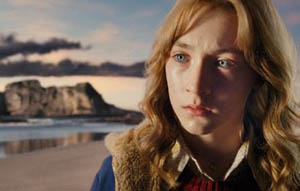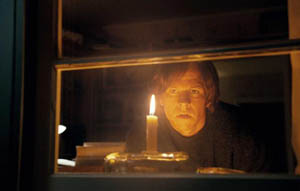|
It must be said that I'm truly thankful for the existence of filmmakers like Peter Jackson. In spite of his lowbrow beginnings, he has emerged as a truly visionary director with an intense passion for his work, a man obsessed with detail and always looking to refine and improve the story right through the final editing process. It's a dedication that's admirable amidst a sea of genericism, and therefore even when he makes missteps, as can be said of this film, there's still something here worth seeing. 
Based on the best-selling novel of the same name, The Lovely Bones the story of a young girl's murder and the journey she and her family must both take, she in an afterlife of sorts and they in the real world, in coming to terms with her death. It's the sort of story often described as 'unfilmable,' which was also oft said, and mistakenly so, of The Lord of the Rings, Jackson's greatest triumph to date. I imagine hearing that the novel would be difficult or impossible to bring to the screen being exactly the sort of thing that would motivate Peter Jackson to attempt to defy the conventional wisdom and do exactly that. Or perhaps, as his roster of prior films would indicate, it was simply his kind of story, one with one foot in reality and one in fantasy. One simply wishes he straddled the divide a bit more effectively. Susie Salmon is fifteen, instantly likeable and not long for this world. She tells her story, in retrospect from the great beyond, of how she was murdered by a neighbor. The scene swings from unnerving to almost charming, but for our foreknowledge, then to exceedingly uncomfortable, suddenly hopeful, and finally to a crashing certainty as we see that, as we've already been told, Susie will not escape her fate. It's assured, solid and affecting. The remainder of the tale is one of coping with loss, both for her family, who have no idea how their daughter was taken, and for Susie, who could move on to another plane of existence if only she could let go of her former life. An unfinished youth and the gradual dissolution of her family in her absence, however, compel her to drift ghost-like through the twilight world straddling mortality and heaven, watching and hoping for resolution. It's hard to say exactly where this film falters; it's only obvious that it does. There's some definite similarities between The Lovely Bones and Jackson's breakout film Heavenly Creatures; both center on murders we know are inevitable, both are narrated by the central female protagonist and both juxtapose lively fantasy with discomfitingly gruesome reality. It's a testament to his skills that the earlier film felt entirely of a piece. This one feels too often like a film divided; Susie's death and consignment to a half-formed afterlife would be a fine setup for her role as narrator, but she is also a character in the story (indeed, we spend more time with her than with any other character in the film), which feels increasingly difficult to manage narratively, as she is virtually impotent in a drama centered on herself. At times she seems to bridge the divide, and there's almost a joyous sense of seeing the manifestation of our greatest desires and hopes, the hysterical optimism that our human feelings are impassioned enough to overcome death itself. They can't, of course. The living must put their own houses in order; it's both the film's greatest strength and its greatest liability. It takes a wholly dismissive view of the myth of "closure," the absurd notion that some vindicating event can make a terrible thing no longer terrible to bear. Jackson isn't making manipulative gratification cinema, intended for audiences to get their rocks off by seeing deplorable individuals becoming the victims of deserved revenge. The story rejects revenge, and avoids wasting time on inordinately vilifying the killer. Apart from the fact that we know he's a murderer, which is quite sufficient to form an opinion of him, the slightly awkward yet avuncular George Harvey is disarmingly normal. At the same time, the film seems to opt for an abstract karmic solution, which doesn't wholly ring true. 
While I normally don't address the views of other critics (i.e. ones you've actually heard of), I must say I've come across some rather bizarre reactions to the film and its story, epitomized by Roger Ebert's castigation of what he perceived as the film's message: that a young girl's rape and murder is meant to be seen as a wonderful thing in light of the beautiful afterlife that awaits her. Aside from apparently hallucinating a rape, which is neither seen nor alluded to anywhere in the film, such perspectives, philosophically valid that they may be, hardly seem fitting as criticisms of this story in isolation, considering that the belief in a heaven or other post-death reward is held by the majority of members in nearly every culture on Earth throughout recorded history, and is hardly the original creation of either Peter Jackson or novelist Alice Sebold. While I've no personal belief in an afterlife, I'm fully aware that the idea was concocted in order to take the sting and fear out of death, and not as a means of absolving murderers. Susie's post-death experiences are a sort of heaven by way of LSD: when she's accepting of her situation, it's beautiful and exhilarating. When she despairs, it becomes withered and harbors nightmares. While her "own perfect world" sometimes threatens to veer into theme park territory, I must assume Ebert somehow missed the part where she helplessly watches as her family falls apart and bitterly laments that she can no longer feel anything but thoughts of hatred for her killer. Likewise, the emotional damage suffered by her family and friends is anything but beautiful. The obvious message here is that the world won't stop without you, but not all good things will die with you, either. In the end, the film succeeds in fits scattered amongst other parts palpably straining to achieve cohesion. It's not a failure, and it's not a triumph. Nor is it in the vast gray area in between that swallows most films. It is, at least, a film I've never seen done before, and likely won't see done again. That certainly counts for something. -review by Matt Murray
|
|
||||||||